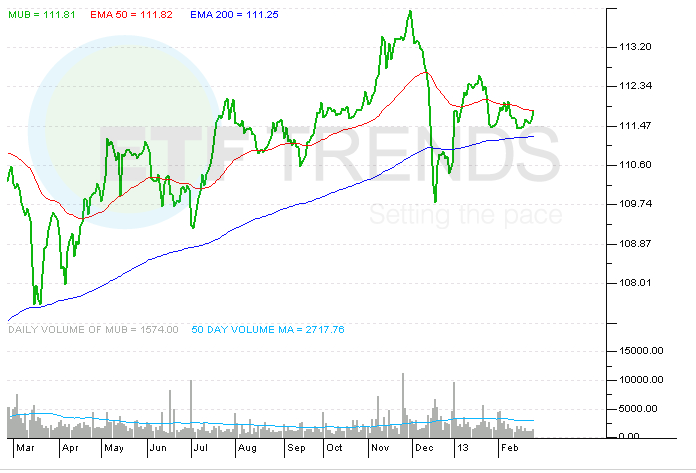Municipal Bond ETFs Shift Gears in 2013
The municipal bond exchange traded fund market had a profitable year in 2012 due to low interest rates. However, circumstances are expected to change this year as automatic Federal spending cuts could start to trickle down after March 1.
“The ‘Fiscal Cliff’ compromise answered the question as to whether interest on municipal bonds would be taxed in 2013. Municipal bonds avoided all the various proposals to eliminate or reduce their tax exemption. In fact, the increase in the top income tax rate to 39.6% from 35.0% may make tax-free municipals more attractive for some high income investors,” Timothy Strauts, analyst, wrote for Morningstar. [BlackRock Cautious on Muni-Bond ETFs]
For the time being, muni bonds have maintained investor interest and remained in favor, but the tax treatment of these tools is unresolved. Going forward, state and city governments have scaled back spending on infrastructure, taken budget cuts and trimmed employees, but have not managed to dodge the possibility of a credit downgrade. Strauts reports that Fitch ratings is expected to downgrade dozens of municipalities in 2013, as property tax receipts lag tax base assessments and public-sector pension funds must be fortified. [Muni-Bond ETFs Keep Tax-Sheltered Status - For Now]
Furthermore, the sequestration of Federal spending is set to take place March 1, and is expected to slow local economies and take a 0.5% bite out of U.S. GDP this year.
Moody’s Investor Service points out some states that have overspent and carry a large default, indicative of how fragile the muni-bond market can become. Jefferson County, Alabama is $3.47 billion short, Washington State has overspent $2.25 billion, and Las Vegas, Nevada is $439 million in the hole, reports Andrew Zarivny for US News.
A state currently in good standing is California, which was given a raised credit rating from Standard and Poor recently. California passed Proposition 30, which will increase taxes for the next four to seven years. The Governor of California proposed a budget surplus for the coming fiscal year, which should relieve the need for California to raise additional funds. [Muni-Bond ETFs Skid on Risk of Tax Increase]
One of the largest municipal bond ETFs is the iShares National AMT-Free Municipal Bond (MUB) , which gives 22% of the portfolio to California bonds, and yields 1.6%. The second largest muni-bond ETF is the SPDR Nuveen Barclays Municipal Bond (TFI) which yields 1.7%. As the spread between the Treasury yield and the municipal bond market tightens, the attraction to this area of the market could dissipate as the prospect for positive returns will become smaller.
iShares National AMT-Free Municipal Bond
Tisha Guerrero contributed to this article.
The opinions and forecasts expressed herein are solely those of Tom Lydon, and may not actually come to pass. Information on this site should not be used or construed as an offer to sell, a solicitation of an offer to buy, or a recommendation for any product.

